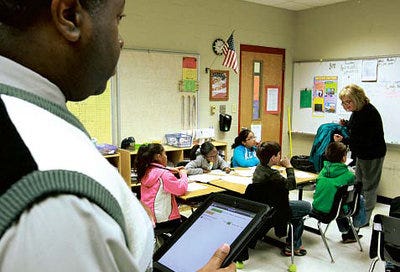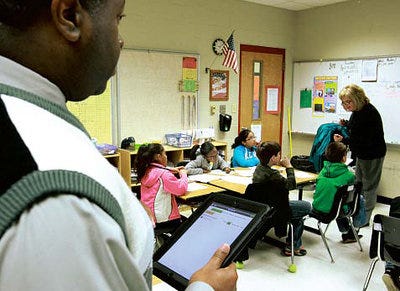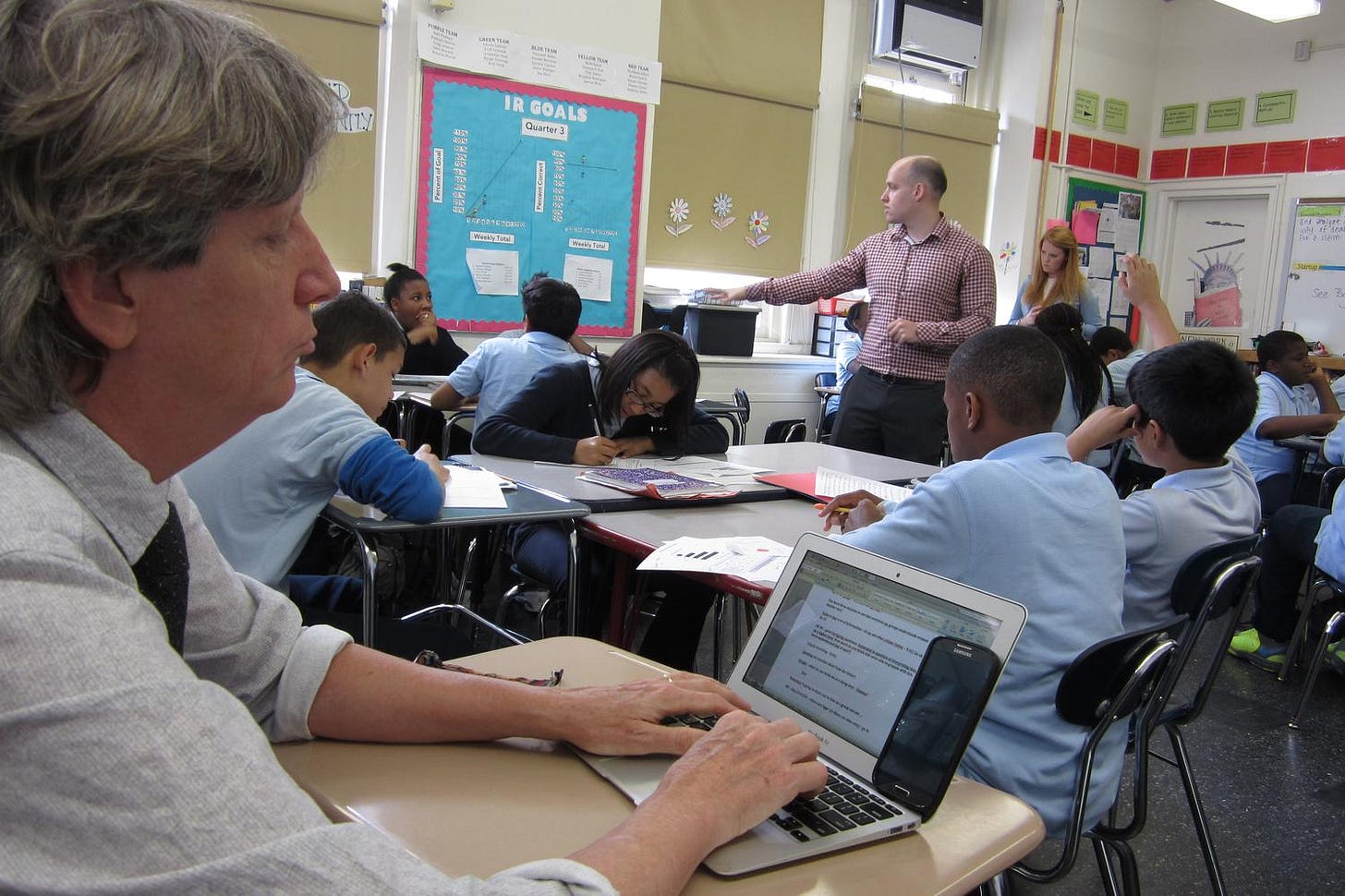How many teachers understand why they are observed? It seems easy to answer if you are a new teacher, but if you are a veteran (5, 10, 15 or 20+ years) why are you still being observed? Doctors are observed. We have internships where it is essential that experienced physicians “observe” what we are doing for the first time to make sure we are doing it right. Other professions also have internships or apprenticeships where experienced professionals “observe” the newcomers and guide them along the first couple of years of work. After a couple of years most people understand what their job is. Outside of teaching, regular observations for professionals end after a couple of years. At that point, we are considered adept at what we do.
And while we are now adept, or competent, we will continue to learn every year we are in practice, but that is why all professionals - including teachers - are mandated to earn continuing education credits through seminars or now, online classes. Teachers are both blessed, and cursed, that we have our CE credits built into our schedule. Otherwise known as our PD’s. Blessed because we do not have to go outside and pay for them, but cursed because, as I have already mentioned, much of this time is meaningless and almost never “seniority-appropriate” or “experience-appropriate”.
But only teachers, in addition to regular in-school PD’s, are also required to be observed - forever. We never reach a point where we are considered to be competent enough to be allowed to teach without being watched over. And these observations could be the biggest issue I have with the profession of teaching. Don’t get me wrong. I loved having administration coming into my room to see what I was teaching on any day of the week. And like so many of you, I would text, email or call the principal or AP to invite them in on a particular day if I had something special planned. These were magical times. But then, the very next week, I could have the same AP come in to do their scheduled formal observation. But why? They just saw my kids learning about Independent Variables and how they affect experimental design, say using baking soda and vinegar. They saw how they were understanding how if the IV was changed proportionally, then the outcome may - or may not - also change proportionally. They saw the delight on their faces when their data supported their hypotheses, or better yet, when it didn’t. And now here they are, iPad strapped on their wrist, making sure I am doing “first year” things correctly: Was my Do Now in the form of a question? Was the Do Now differentiated? Did the Do Now take too long, or too short? Was the Aim at the top of the Smart Board or the bottom? Am I calling on students heterogeneously?
And while this may seem quite normal for some, I found - after the initial year or two of becoming a teacher - observations to be the most demeaning and degrading process of education. These feelings only increased with each year. And not just for me, but for the veteran teachers who were being given evaluations of Deficient or Unsatisfactory. These were outstanding educators who routinely went above and beyond but were having their legs cut out from under them for an undifferentiated Do Now or for not “wrapping up” in time. I have spoken with veteran teachers who receive an Unsatisfactory write up and they were just shattered. I cannot think of a more humiliating or degrading experience for any professional to go through.
Imagine going to see your cardiologist, who you’ve been seeing for 25 years, and there is a young doctor in the room watching everything your doctor does, taking notes on his iPad strapped to his wrist. On the next visit you ask what that was about. He tells you that he was being observed to make sure he took your blood pressure correctly and listened to your heart properly. What would you think? Or you are buying a home, and you go to the closing with your lawyer, real estate agent and another person is in there with an iPad - strapped to his wrist - taking notes. Later you ask who that was, and he tells you he was there to make sure you handed out the papers in the correct order or you had him sign in the right place, or to make sure your lawyer was seated in the correct chair. Again, what would you think of either one of these scenarios? But this is what teachers go through, year after year. And no, it doesn’t get easier. Being observed is a nerve-wracking experience that does nothing to “professionally develop” any educator. Not to mention, administrators know exactly what I am talking about as they were once in the teacher’s shoes.
There is a better way.
A few years ago, I posted two discussions on LinkedIn questioning the need, viability and justification for continuing with the current system of teacher evaluation entitled: “TEACHER OBSERVATIONS DON’T WORK… BUT WHY?” and “WHY ARE TEACHERS EVALUATED?” The responses showed wide ranging doubt on both the effectiveness and worth of the evaluative system, and was strongly support by teachers (as well as some forward-thinking administrators) for change in this area. Here are overviews from both schools of thought.
Administrators in general believe there is an absolute need for evaluations to continue in their current form, only with minor modifications. Overall, they feel teacher observations are a necessary element of teaching and have confidence they are producing “some type of” desired result.
Teachers, on the other hand, overwhelmingly believe there is ample room for improvement in evaluations to help promote teacher growth and development but are unsure how to go about change. Their comments revealed they feel that the deck is stacked against them. They suggested a variety of options from minor modifications of the current system to eliminating it completely - both of which I do not agree with. Unsurprisingly, they do not share administration’s feeling of success brought on by the observation process.
Many believe that administration’s hands are tied and that nothing can be done to make changes. Nothing could be further from the truth.
My LinkedIn articles were intended to initiate a dialogue for change in teacher observations to achieve one goal - to bring about improved student success - which we can all agree is urgently needed. What better place to begin getting more for our kids than by revamping a program that is suspect by most, highly subjective at best, and seemingly non-productive for every teacher on the receiving end. In my conversations with administrators, though a few may disagree, most are dissatisfied with the outcomes of observations given the time and energy they must invest to perform them. One of the last comments summed it up and I am paraphrasing, “If teacher observations did what they were designed to do – support development and greater teacher competency to increase student achievement – then why aren’t we seeing the increased student successes as a result?” It doesn’t get much simpler than this.
In spite of the many ideas brought to the table, what was missing from both management and labor perspectives were comprehensive solutions that would:
eliminate the current formal observation process
substitute it with a valid data-driven system of evaluation
be powered by student outcomes
use goal-setting to statistically analyze “trending” of both teacher and student growth
satisfy both parties (teachers and administration)
In truth, I have always hoped for one administrator, one school, to say, “Look, if you have a better way, our school is willing to try it”, but that has never happened, so I am offering a pilot proposal – and it is all about DATA. We need to agree on a common starting point, so let’s use what we (schools/teachers) have top bragging rights to – GREAT DATA.
Like it, love it or hate data is our most valuable, yet under-appreciated and way undervalued asset. We use data to catalog students in every way possible and then reorder them on so many sub-levels but fail to rely on its ability to help quantify the qualitative effectiveness of a teacher. It seems only right if we can use data to quantify student progress, then the next logical step would be to use the same data to quantify teacher progress. If we can use data to show how effectively a teacher is performing, based on daily classroom data plus student achievement, then why would blanket formal “subjective high-stakes” evaluations ever be necessary again? If we are to avoid the type of fallout shown by current humiliating observations, we need to have this discussion. Schools must stop just “winging it” with the unsubstantiated use of both biased and subjective teacher observations. No matter how you slice it, current observations are subjective. One would think principals would jump at the chance to learn how to make observations easier, more quantifiable, and better at developing both teacher and student outcomes.
So why aren’t we using data to our greater advantage? If students of a particular teacher are experiencing either good or bad classroom results – trending up or down – then why isn’t this used as the primary data used to validate teacher competency in the classroom rather than informal walk-throughs, formal observations, or a hybrid of the two - or differentiated Do Now’s? And what about all the other data teachers accumulate on a daily basis? Why isn’t that also being used to rate teacher effectiveness?
How about teacher competency and data. Teachers are hired with a reasonable “expectation of competency,” and they begin producing lots of data in the first few weeks. Not just grades, but also a vast untapped source of secondary data every teacher has, yet which is not currently used as proof of proficiency. Why is all this data not being used as a benchmark of competency prior to an observation? Two reasons.
One, because teachers do not typically structure their data to be presented as such. And if it is being used in pre-observations, please show me because I have kept this data for years and not one administrator has asked to see it. Yes, they love my big Goal-Setting graph I have every year, but they never ask how it is used. Why not?
I guess that teachers are evaluated to improve student outcomes, so why isn’t this the first place we look? Why isn’t a baseline created here to monitor future growth and trending that is created and kept in each individual teachers’ classroom? It is so easy for a teacher to collect, organize and present/display data for administration if they are shown how to do it. This is done through Goal Setting, Prioritization, Time Management and Parent Contact using the School Goals Work program.
Two, administrators have never been taught how to use this classroom data because teachers are not collecting and managing this data to be used as an evaluative tool. The idea of evaluation via classroom data versus formal/informal observations is an idea used daily outside of schools and would work wonderfully in schools if only it was given a chance. (Yes - shameless plug - this is where I am looking for a handful of administrators to read this and call me to ask how this works! 631-664-7885 or schoolgoalswork@gmail.com)
Not being aware of teacher progress using statistical analysis of data, via baselines and trending – but going ahead with an observation anyway – is not really helping to improve teacher development but is merely observing for the sake of saying an observation was performed. This is unproductive, not good for anyone and will never create the desired result, which is to produce well-developed teachers building maximum student achievement. We need to look at the data. If we really want to increase student achievement, data must be the driving force. Data drives productivity in all other professions, but how often is data used to formulate accurate evaluations? This is our biggest missing link.
Next week I will outline the components necessary for developing a sound program of data-driven observations that would make the entire process more efficient, productive, and supportive for teachers while creating a whole new way to look at options for increasing student achievement. How many principals would be willing to try these steps as an alternative to the traditional teacher observation? Please read next week’s post for developing Teacher Data-Driven Evaluations. You have never seen anything like this!
Dr. Cubbin
schoolgoalswork.com / schoolgoalswork@gmail.com / 631-664-7885








